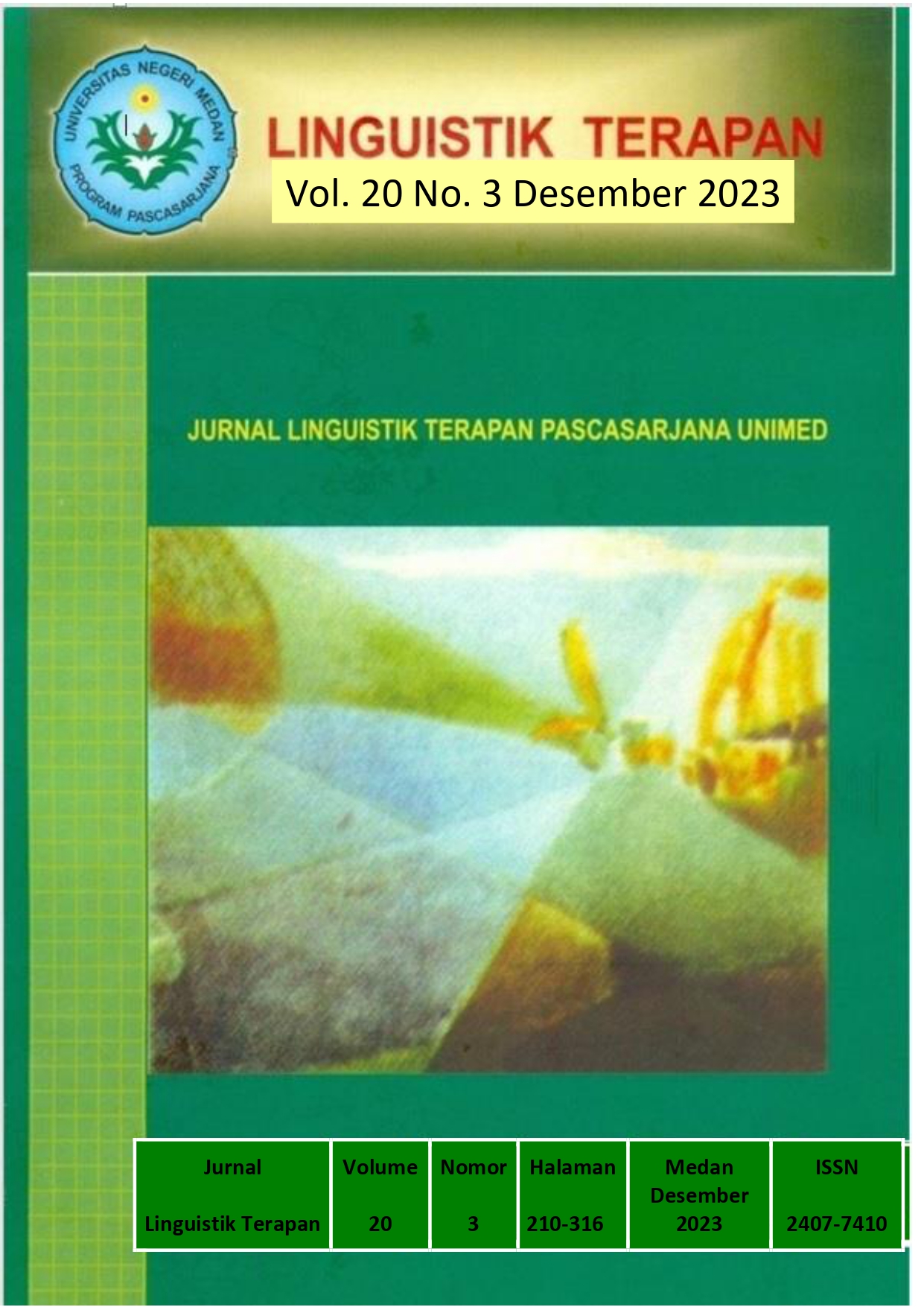PRESIDENTIAL CANDIDATES™ SPEECH ON YOUTUBE: A VIEW OF METAPHORICAL
DOI:
https://doi.org/10.24114/lt.v20i3.58567Keywords:
Holistic, Teaching Model, Students’ Personalities, Analytical ExpositionAbstract
Indonesia is currently facing the political issues, including the election of potential Presidential candidates for the period of 2024 to 2029. This study aims to find out the types of metaphor used by the three of Indonesian presidential candidates and are the metaphor used by presidential candidates™ speech on YouTube. This study applied qualitative research method as the design in the analyzing the data. The study subject were three Indonesian presidential candidates with the data from the utterances according to three Indonesian presidential candidates™ speeches. The source of the data was taken from three Indonesian presidential candidates in Bicara Gagasan-Mata Najwa youtube channel for Indonesia election 2024. The findings showed that three types of metaphor used by the three Indonesian presidential candidates are structural metaphor, oriental metaphor and ontology metaphor. The three types of metaphor used by Indonesian presidential candidates on their speech such as; structural metaphor was about 7 (53.8%), orientational metaphor was about 2 (15.4%) and ontology metaphor around 4 (30.8%). The most dominant types of metaphor used by Indonesia presidential candidates in the Indonesia election 2024 is structural metaphor. Meanwhile, the reasons of Indonesian presidential candidates used metaphor on their speech were for directing and limiting the audience's understanding. Political speeches benefit from the use of metaphors, which clarify complex concepts through physical experiences and sensory explanations.References
Gibson, R. K., & McAllister, I. (2011). Do Online Election Campaigns Win Votes? The 2007 Australian œYouTube Election. Political Communication, 28 (2), 227“244. https://doi. org/10.1080/10584609.2011.56804
Jungherr, A. (2016). Twitter Use in Election Campaigns: A Systematic Literature Review. Journal of Information Technology & Politics, 13(1), 72“91. doi:10.1080/19331681.2015.1132401
Kövecses, Z. 2010. Metaphor: A Practical Introduction. Oxford University Press
Krennmayr, T. (2011). Metaphor in Newspaper. Netherland: LOT Vrije Universiteit.
Lakoff, G & Johnson, M. (1980). Metaphors We Live by. Chicago and London: The University of Chicago Press.
Lakoff, G. & Z. Kövecses. (1987). The Cognitive Model of Anger Inherent in American English. In D. Holland & N. Quinn (Eds.). Cultural Models in Language and Thought. 195“221. Cambridge: Cambridge University Press.
Lakoff, G. (1993). Contemporary Metaphor. Ortony (Ed.). Metaphor and Thought. 202“251. Cambridge: Cambridge University Press.
Lakoff, G., & Johnson, M. (2003). Metaphors We Live by. London: University of Chicago Press.
Pasaribu, T. A. (2013). A Cognitive Linguistic Analysis of Indonesian Love Metaphors. Seminar Internasional. Yogyakarta: UGM
PavlÃková, Ž. (2018): Figurative Language in Political Discourse. In: Å¡tefanÄÃk, r. (ed.): Jazyk a
Politika: Na pomedzà Lingvistiky a Politológie III. Bratislava: Ekonóm.
Pilyarchuk, K.; Onysko, A. (2018): Conceptual Metaphors in Donald Trump™s Political Speeches: Framing his Topics and (Self) Constructing his Persona. In: Colloquium: New Philologies. Vol. 3, No. 2.
Shäffner, C. (1996): Editorial: Political Speeches and Discourse Analysis, In: Current Issues in Language and Society, Vol. 3, No. 3, pp 201 -204
Silitonga, I. C. (2020). Lexical Metaphor in Novel and Film Critical Eleven. Unpublished Master Thesis. Medan: University of Medan
Å tefanÄÃk, R. (2016): Politický jazyk. Ako ho definovaÅ¥? In: Å TEFANÄŒÃK, R. (ed.): Jazyk a politika: Na pomedzà lingvistiky a politológie, Bratislava: Ekonom
Å tefanÄÃk, R. (2020): Metafora vojny v jazyku politiky. In: Lingua et Vita, Vol. 9, No. 1, pp. 59-69.
Downloads
Published
How to Cite
Issue
Section
License
Copyright (c) 2024 Anggina Mayla Yasi Br. Karo

This work is licensed under a Creative Commons Attribution-ShareAlike 4.0 International License.






